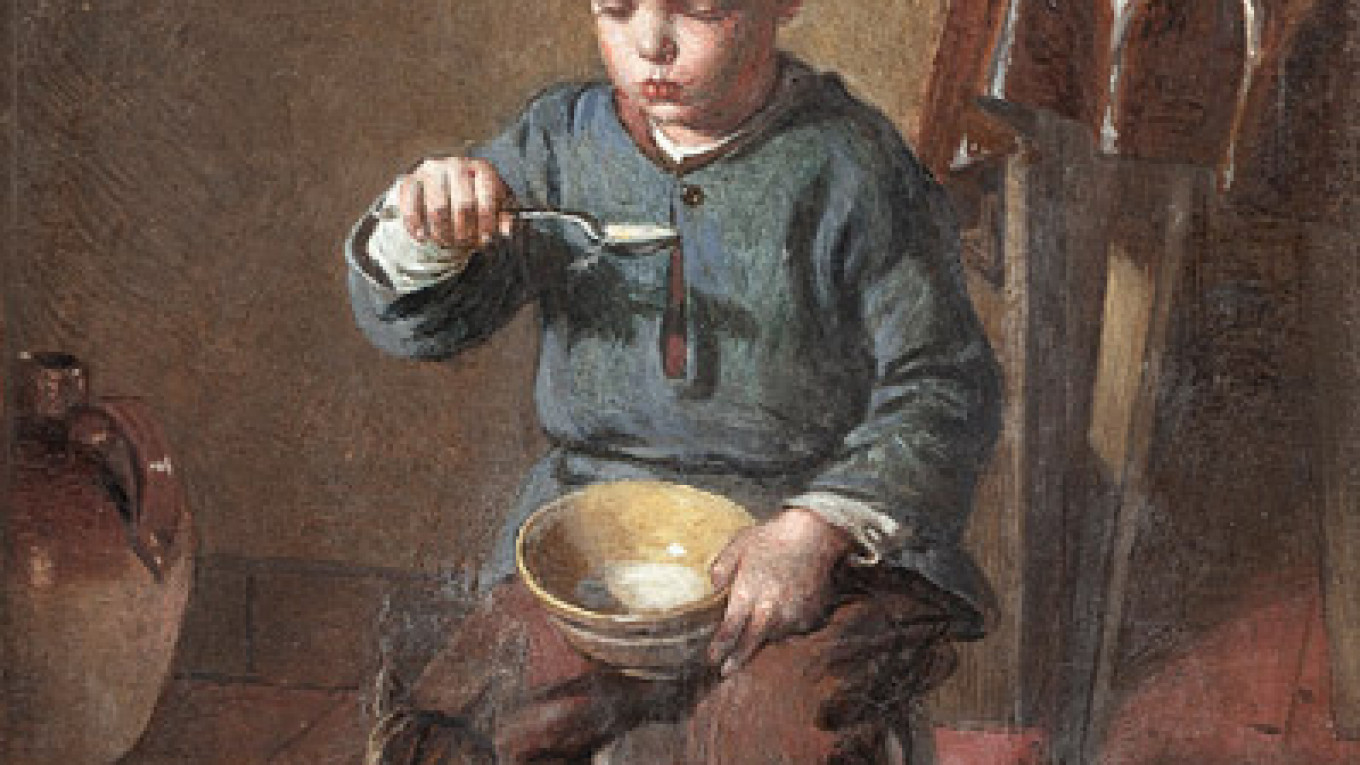Ка́ша во рту: to mumble
I'm still stuck on mouth expressions, mostly because it gives everyone practice in pronouncing рот when it's declined. There is nothing more fun for foreigners than a mass of Russian consonants with nary a vowel in sight. Makes you think you have каша во рту (to mumble unintelligibly, literally to have "a mouthful of porridge"). The first time I heard that phrase I went crazy trying to find the word "варту" in the dictionary.
There are plenty of other mouth expressions that involve eating more than porridge. You can have a mouth full of troubles — the rhyming хлопот (or забот) полон рот.
In English it's a handful, not a mouthful: У неё был хлопот полон рот с мужем, который был непрерывно пьян. (She really had her hands full with her husband, who was constantly drunk.)
В рот не лезет (literally, "it can't crawl into my mouth") is what you say when you are either too full to eat or too upset or excited to even think about food. Все говорили, что еда в рот не лезет во время свадьбы, но мы с женой были такими голодными, что съели всё. (Everyone told us that we wouldn't be able to eat a thing at the wedding, but my wife and I were starving and ate everything.)
You say не брать в рот (don't put [it] in your mouth) when you are consciously abstaining. Он спиртного в рот не берёт. (He doesn't drink alcohol.) But a twist on this — в рот не возьмёшь (you won't put it in your mouth) — means you shouldn't touch the stuff because it's spoiled or otherwise unappetizing. Блюдо было очень острым, в рот не возьмёшь. (The dish was so spicy that it was inedible.)
It's never a good idea to stick your finger in someone's mouth, but in Russian it's especially dangerous. It indicates someone who has an explosive temper. Как только мы начали жить вместе, его родители пытались лезть, но мне палец в рот не клади. (As soon as we started living together his parents started butting in, but I'd bite their heads off.)
Someone with a bad temper might speak с пеной у рта (foaming at the mouth): С пеной у рта автор доказывал режиссёру, что тот совершенно не прав. (Foaming at the mouth, the writer tried to prove to the director that he was wrong.)
Then there is the unappetizing разжевать и в рот положить (to chew it up and put it in his mouth) — what you say when you have to spell something out for someone. Учишь их, учишь демократии, разжуёшь им, в рот положишь — не берут! (You teach them, you teach them democracy, you cut it up in little pieces for them — but they won't take it!)
Sometimes something slips by your mouth — мимо рта пронесёт. This might be literal, but it is usually figurative and means that some opportunity or good fortune has passed you by. Or not: Рыжий кругломордый мужик, из тех, что мимо рта ложку не пронесут. (He was a red-headed, round-faced guy, the kind who never misses a trick.)
If this guy wants to give you some advice, you might смотреть ему в рот (literally "to look him in the mouth"), which sounds rather rude but means to hang on someone's every word.
While you're looking, check for foam and porridge.
Michele A. Berdy, a Moscow-based translator and interpreter, is author of "The Russian Word's Worth" (Glas), a collection of her columns.
A Message from The Moscow Times:
Dear readers,
We are facing unprecedented challenges. Russia's Prosecutor General's Office has designated The Moscow Times as an "undesirable" organization, criminalizing our work and putting our staff at risk of prosecution. This follows our earlier unjust labeling as a "foreign agent."
These actions are direct attempts to silence independent journalism in Russia. The authorities claim our work "discredits the decisions of the Russian leadership." We see things differently: we strive to provide accurate, unbiased reporting on Russia.
We, the journalists of The Moscow Times, refuse to be silenced. But to continue our work, we need your help.
Your support, no matter how small, makes a world of difference. If you can, please support us monthly starting from just $2. It's quick to set up, and every contribution makes a significant impact.
By supporting The Moscow Times, you're defending open, independent journalism in the face of repression. Thank you for standing with us.
Remind me later.








